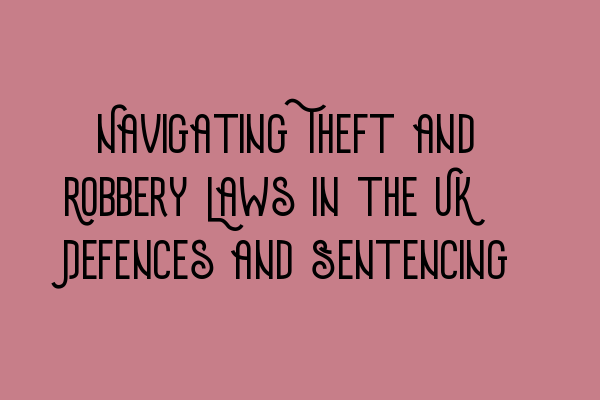Navigating Theft and Robbery Laws in the UK: Defences and Sentencing
Welcome to SQE Criminal Law & Practice UK, your trusted source for legal guidance and information. In today’s blog post, we will be discussing theft and robbery laws in the UK, focusing on the available defences and the potential sentencing outcomes in such cases. Understanding these aspects is crucial for both legal professionals and individuals seeking to navigate the justice system.
Theft Laws in the UK
Theft is a serious criminal offence in the UK and is governed by the Theft Act 1968. It is defined as dishonestly appropriating property belonging to another person with the intention to permanently deprive the owner of it.
When it comes to theft charges, it is essential to understand the available defences that can be used to challenge such allegations. These defences include:
- Claim of Right: This defence asserts that the accused genuinely believed they had a legal right to the property in question.
- Mistake: If the defendant can prove that their actions were a result of an honest and reasonable mistake, this can be used as a defence.
- Consent: If the owner of the property consented to the accused’s actions, this can be a valid defence.
- Duress: If the defendant can prove they were coerced or threatened into committing the theft, this can be a viable defence.
These defences empower legal professionals to challenge theft allegations, and our SQE 1 Preparation Courses equip aspiring solicitors with the knowledge and expertise to build strong defence strategies.
Robbery Laws in the UK
Robbery is a more serious offence than theft and involves theft along with the use or threat of force. The offence is regulated by the Theft Act 1968, and the consequences for those found guilty of robbery can be severe.
Similar to theft cases, it is crucial to be aware of the available defences against robbery charges. These defences can include:
- Lack of Intent: If the defendant can prove that they did not have the intention to commit robbery, this can be a potential defence.
- Identification: If the accused can challenge the identification evidence presented by the prosecution, it can weaken their case.
- Lack of Force: If the defendant can demonstrate that no force or threat was used during the alleged robbery, this can be a valuable defence strategy.
To effectively navigate robbery charges, consult with our experienced solicitors at SQE Criminal Law & Practice Law UK. We will guide you through the legal complexities and help build a robust defence strategy.
Sentencing for Theft and Robbery
The sentencing for theft and robbery offences varies depending on various factors, such as the scale of the crime, the offender’s criminal history, and the level of violence involved. Sentences can range from fines to imprisonment, and in extreme cases, life sentences for aggravated robberies.
To stay updated with the latest SQE exam dates and prepare yourself for a career in criminal law, explore our SQE 2 Preparation Courses. These courses offer comprehensive training and resources to help you excel in the solicitor qualifying examinations.
As legal professionals, it is essential to stay well-informed about the intricacies of theft and robbery laws in the UK. By understanding the available defences and potential sentencing outcomes, you can effectively advocate for your clients and ensure a fair and just legal process.
For more legal articles, insights, and SRA SQE Exam Dates, visit our blog regularly. At SQE Criminal Law & Practice Law UK, we are committed to providing valuable resources to support your journey in the legal profession.
